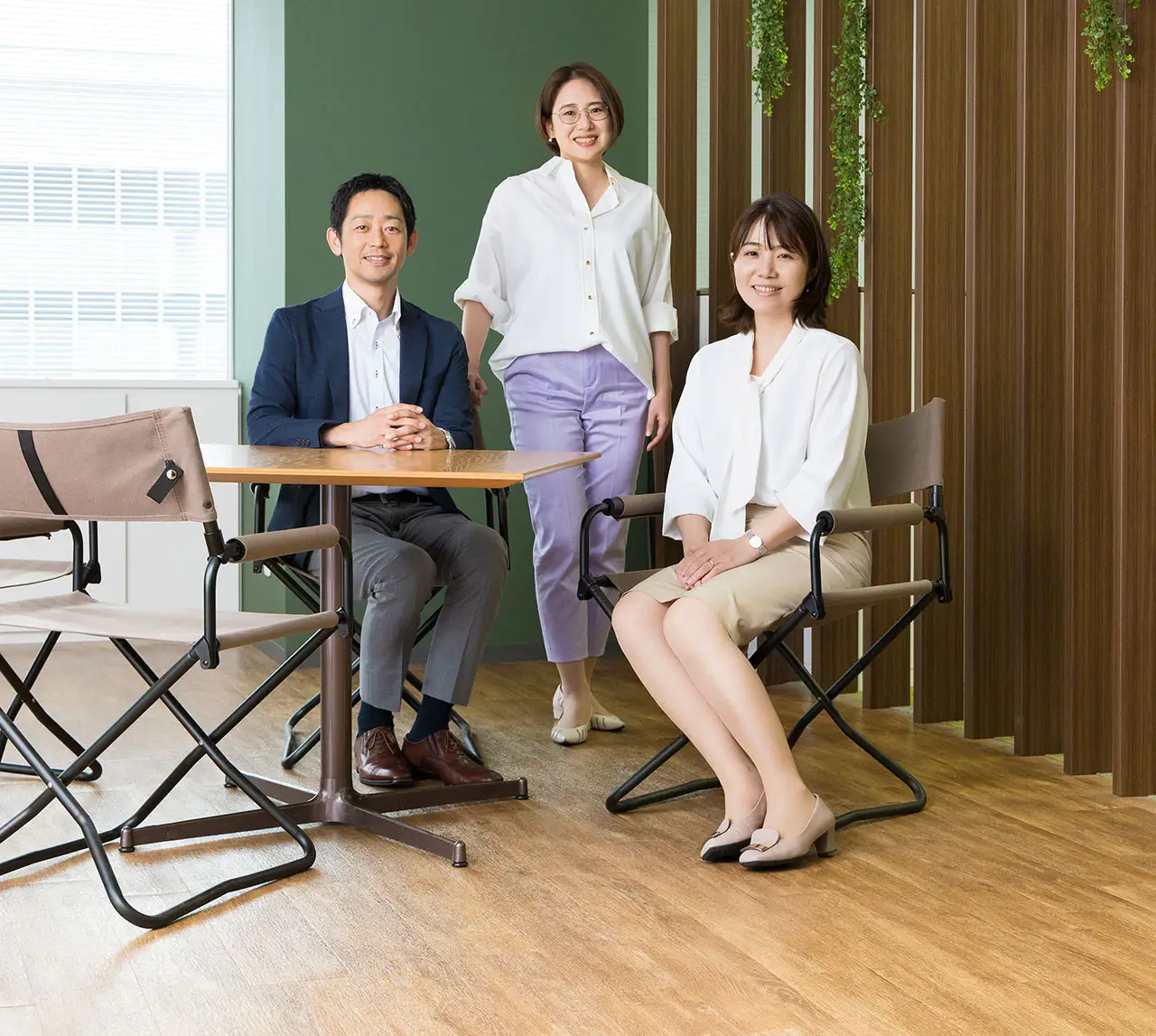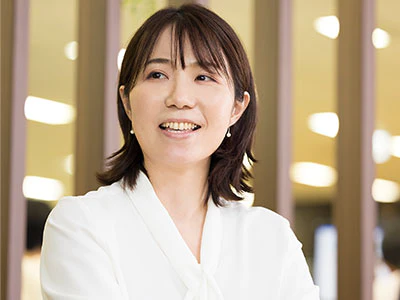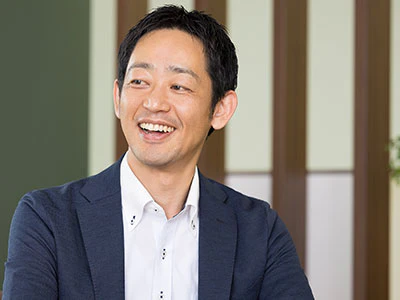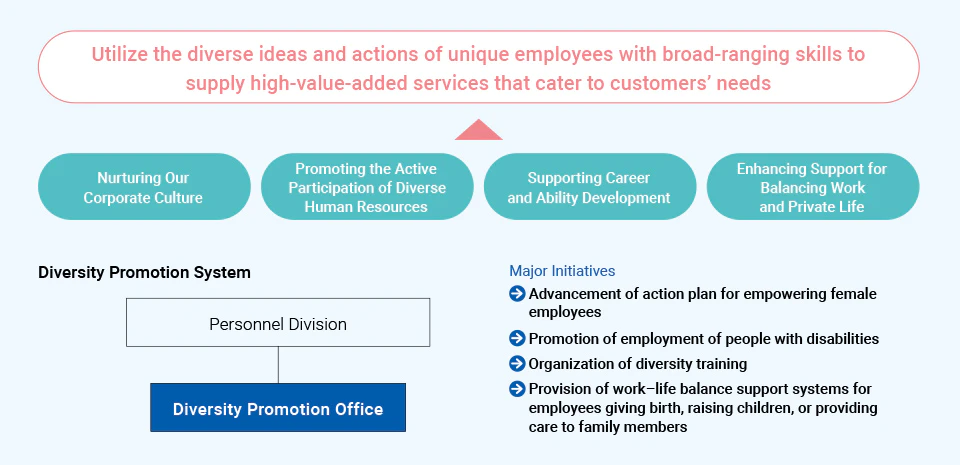INTEGRATED REPORT 2023
BACK NUMBERS

Evolution Driven by a Diverse and Flat Organizational Culture
Tokyo Century aspires to craft a diverse and flat organizational culture. We arranged a roundtable discussion on the subject of Tokyo Century’s evolution in which frank opinions were shared regarding the thoughts and careers of the participants, specifically two individuals who had previously taken childcare leave and the deputy general manager of the Diversity Promotion Office.
- Deputy General Manager
Real Estate Finance Division II - Keisuke Yoshida
- Deputy General Manager
Diversity Promotion Office
Personnel Division - Chika Kato
- Deputy General Manager
Environmental Infrastructure
Strategic Planning Division - Kyoko Asami
Career at Tokyo Century
- Yoshida
After joining the Company in 2004, I spent two years in a sales position for leasing operations in the Equipment Leasing segment. I was then transferred to the International Business segment, where I was charged with supporting subsidiaries in China and other parts of Asia, which even included a four-year appointment in Thailand. I was later moved to the Ship Finance Division of the Specialty Financing segment before taking up my current position in Real Estate Finance Division II. When I was stationed in Thailand, my first child was born, which led to my returning to Japan to take three months of childcare leave.
- Asami
I joined in 2005, at which time I was positioned in what would later become the Structured Finance Division. There, I gained experience in a wide range of areas, including securitization of notes and receivables, private finance initiatives, and inventory financing. It was in this position that I took maternity and childcare leave for my first child. I would then go on to do the same after the birth of my second child when working in the Specialty Finance Strategic Planning Division. In April 2023, I was transferred to the Environmental Infrastructure Strategic Planning Division of the newly established Environmental Infrastructure segment. In this position, I am responsible for planning and promoting strategies through tasks such as formulating sales targets and evaluation systems and monitoring our numerical data during set periods.
- Kato
It was in 2006 when I joined, after which I spent around eight years in leasing sales targeting hospitals and clinics in the Medical & Healthcare Division. I was then transferred to a division that would later become part of the Environmental Infrastructure segment, where I assumed project finance duties. In April 2023, I was assigned to the Diversity Promotion Office in the Personnel Division. Here, I am trying to foster an organizational culture that empowers employees while allowing them to balance their work and private lives.
Corporate Culture Supporting Changes in Life Events and Workstyles
Mr. Yoshida, could you please tell us what led you to take childcare leave?
- Yoshida
My wife wanted to keep working even after we got married. When we talked about it, we agreed that we would need to share the household duties if we were both going to work. Tokyo Century introduced some work–life balance support systems around 2008, which prompted me to take childcare leave.
While there was no precedent of a male employee taking childcare leave at Tokyo Century, I thought I had no choice but to do so if I was going to share the household responsibilities with my wife. I therefore had no hangups about my decision. Taking childcare leave did not impede my work at all, but it did really change how I thought about working. My wife and I have defined a clear division of responsibility for household duties such as dropping off and picking up our children, and I generally leave the office on time twice a week. In the past, I would work overtime almost every day, but the need to avoid working late forced me to rethink how I work, making me even more conscious of the importance of working efficiently.
However, as we do have busy periods at Tokyo Century, it is important that I maintain the understanding and cooperation of my colleagues. I am very grateful for how accommodating my subordinates and other coworkers are toward my chosen workstyle.
Ms. Asami, what do you value when trying to balance your career with your family responsibilities?
- Asami
When I was pregnant with my first child, I remember having to go on sales calls a lot, which was quite physically demanding. However, the fact that I faced no restrictions in my work allowed me to completely devote myself to both my job and my child. Raising a child means limiting the amount of time one can work. It is also not unusual for a child to come down with a fever or other ailment, and this created cases in which I was unable to complete my work by myself. Although I did my best to finish my work by myself at such times, I made sure to keep my group up-to-date or have another person assigned to my projects so as to ensure that someone else could step in and help when I could not get it all done on my own. In this manner, I went about my work with the understanding of my coworkers.
Being a manager entails an increased burden in terms of work volume and responsibility, while being a parent involves participating in the various life events of your child. Striking a balance between parental and professional responsibilities requires the understanding of both my family and my colleagues. It is not all about getting help for myself; I also think it is important to actively try and offer support and help to those around me. My husband is able to work remotely, and I was therefore able to trust him with a majority of the housework and child-rearing responsibilities when I was struggling to get used to my position in a new division. As this shows, my husband is also working with the understanding of his colleagues.

Ms. Kato, what do you focus on when trying to support the diverse workstyles and life events of employees as a member of the Personnel Division?
- Kato

Rather than thinking about things in terms of differences in age or gender, I try to remember that everyone’s situation is different. It is always best, to the extent possible, to offer people the support they need and when they need it based on their own individual circumstances. Common questions people ask me about concern, as you would guess, childbirth and other life events. We thus arrange opportunities to meet with employees and explain Tokyo Century’s systems at junctures such as before they take childcare leave or when they are preparing to return. I attend such meetings, which makes me privy to the wide range of requests and opinions that employees can have. I therefore hope to refine our systems to make it easier to gather feedback directly from employees.
Tokyo Century has a 100% rate of male employees taking childcare leave, but I understand that some people feel hesitant to go on extended periods of leave that span multiple months. There are a lot of reasons people might feel such hesitation, whether it be concern for the future of their career, issues with turning their projects over to another person, or a lack of staff in their division. This is why it is so important for us to raise understanding among all employees with regard to system use, workstyles, and diversity. We do so by offering training and e-learning programs to employees at various levels of the hierarchy, including system users as well as management.
Evolution of Diversity at Tokyo Century
- Yoshida
All of the career-track employees who joined the Company around the same time as me were men, and there were almost no female managers or non-Japanese employees at that time. Today, however, around half of new-graduate hires in any given year are women, and we have seen a rise in the number of female managers and non-Japanese colleagues. This is indicative of a massive change in the environment at Tokyo Century. Being able to expose myself to various ways of thinking thanks to this environment is really amazing.
- Asami
The number of women is on the rise throughout the Company, thereby also increasing the number of employees who have experienced childbirth or child-rearing as well as the number of people who have taken up management positions after returning from childcare leave. These changes are a benefit of Tokyo Century’s giving employees the ability to work from home. This ability means that pregnant women can avoid the physical burden of commuting to and from the office, while people who need to be at home for their children do not necessarily need to take a full day off. Moreover, people working from home do not have to be shut out from what is going on in the office, which is important to the development of their careers.
- Kato
I too have noticed the change in terms of the diversification of workstyles that Ms. Asami speaks of. Another big change has been the increase in mid-career hires. The resulting opportunities to interact with people who have diverse backgrounds not limited to finance has a positive influence by giving us exposure to different sets of values. This understanding of diverse values comes along naturally, which in turn helps us transition from a mindset of expecting things to be a certain way to one of realizing that there is no single answer to any given question. I truly feel that Tokyo Century as a whole has become more accepting to such diverse ways of thinking.
Importance of Diversity to Tokyo Century’s Growth
- Yoshida
As implied by Ms. Kato, the ability to be exposed to and be receptive toward ideas that differ from what you are used to will likely be critical to the future growth of Tokyo Century. I think it would be a good idea for Tokyo Century to continue to bolster its staff of people recruited from different industries and other individuals with different backgrounds. At the same time, as changing one’s company has now become commonplace in Japan, we are faced with a situation in which people may choose to leave the moment they feel the work they do at the Company is no longer fulfilling. It would be a waste if we lost talented individuals for this reason. It is therefore crucial for Tokyo Century to inspire employees to remain at the Company for as long as possible by making its vision resonate with employees and having managers clarify the roles and missions of each member of their team. Once this is done, we should focus on the development and operation of organizations that align everyone along the same vector so that we are a unified company.

- Kato
If we want employees to stay with us longer, it is definitely important that our vision resonates with them. In addition, feeling that one’s work is contributing to society is another way that people develop a sense of attachment toward their company. Conversely, if there is a lack of communication in the workplace, it is possible that even a small concern might prompt a quick decision to change jobs, as one will feel that they have no one to talk to about their concerns. This is why, in addition to career training, the Personnel Division arranges forums for exchanges between employees. Having someone to talk to can help prevent people from leaving, and I hope that we can continue to improve our workplace environment to ensure such openness.
- Asami
I suspect that, when someone is looking to change company mid-career, they are more likely to apply for a position at a company that is promoting diversity and which is more accepting toward diverse values, because they will probably perceive such companies as being more conducive to allowing people to exercise their unique individual skills. The reverse is also likely true; companies that are less diverse will see fewer applicants.
- Yoshida
Last year, my department welcomed a mid-career individual who was recruited from the real estate industry. I have learned a lot from this person as they have been proposing ideas from a completely different perspective than my department while also making use of their connections within the real estate industry. However, even if something seems new to us, it might be just a matter of course for someone from a different industry, and these differences in perspectives make talking with people from other industries incredibly engaging.
- Kato
We have seen highly specialized individuals transfer to the Specialty Financing segment, the Environmental Infrastructure segment, and other parts of the Company. These employees have completely different expertise and connections than those who started their career at Tokyo Century. Accordingly, the presence of such individuals is sure to be a great source of strength for the Tokyo Century Group as well as a driver of innovation.
Another benefit of a diverse workplace is the opportunity to talk to people who have experienced diverse careers and life events. This can help us notice any unconscious biases we might have, and this awareness will make it easier for us to understand and communicate with other people. Moreover, hearing about a field that you have not experienced or have no knowledge of can heighten your creativity, which is an important skill for business. As a member of the Personnel Division, I intend to continue to proactively promote diversity at the Tokyo Century Group so that we can take advantage of these benefits.
The Tokyo Century Group’s Basic Diversity Policy and Initiatives
